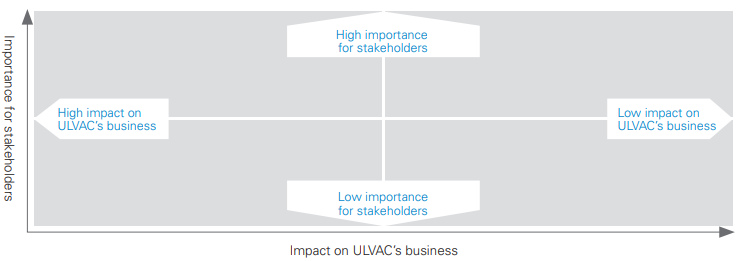Materiality
Basic Approach
In the process of identifying materiality, we conducted an internal review and had in-depth discussions as well as dialogues with external directors, external experts, institutional investors, and others. Reflecting the suggestions obtained, we considered materiality in a broader sense from the viewpoint of enhancement of corporate value and have positioned materiality as "ULVAC's unique management issues for realization of our goal for 2050 and Vision 2032."
Identification Process
【STEP 1】Organize points of emphasis
Based on our goal for 2050 and Vision 2032, we organized the points of emphasis.
- ・Basic Corporate Philosophy and purpose, Business Philosophy, Employee Principle
- ・Uniqueness that differentiates ULVAC
- ・To enhance economic, social, and environmental value
【STEP 2】Identify issues
Social Issues: We firstly exhaustively selected items from among the evaluation items of ESG evaluation organizations, non-financial information disclosure standards*, and other requirements, and then, based on the points of emphasis, we shortlisted the items, considering the degree of importance and the aspects that should be addressed from a long-term perspective in order to achieve our goals.
* Global Reporting Initiative (GRI) Standards, ISO 26000 (Guidance on Social Responsibility), Sustainable Development Goals (SDGs), Ten Principles of the UN Global Compact, Task Force on Climate-related Financial Disclosure (TCFD), Responsible Business Alliance (RBA) Code of Conduct, International Integrated Reporting Framework of the International Integrated Reporting Council (IIRC), Guidance for Integrated Corporate Disclosure and Company-Investor Dialogues for Collaborative Value Creation (Guidance for Collaborative Value Creation) released by the Ministry of Economy, Trade and Industry (METI), etc.
Business Issues:The secretariat of the Board of Directors played a central role in identifying ULVAC's unique management issues. In addition, at the management meeting on strategy, the awareness of issues at head office divisions was clarified and opportunities and risks for business divisions were identified.
【STEP 3】Evaluate importance
In evaluating importance, we evaluated and prioritized items based on the two axes of the "degree of importance for stakeholders" and the "degree of impact on ULVAC's business," and then considered whether the items have a significant impact over the long term. Regarding the degree of "importance for stakeholders," we defined customers, employees, suppliers, communities, and shareholders/investors as our stakeholders and quantified their expectations. The degree of "impact on ULVAC's business" was quantified based on the impact on profit and loss, laws and regulations, codes of conduct, and policies, as well as the Basic Corporate Philosophy, Business Philosophy, and other company policies, and evaluation criteria such as investment for growth.

【STEP 4】Identify
A series of discussions were held at meetings attended by members of the Sustainability Promotion Committee, internal directors, and managers of head office divisions and business divisions. Following discussions under a company-wide cross-functional structure, based on certain hypotheses, we had dialogues with external directors, institutional investors, experts, and others to confirm their expectations and requests of the ULVAC Group and to organize the issues.
【STEP 5】Determine
The Executive Officer in charge of sustainability who chairs the Sustainability Promotion Committee verified the appropriateness of the materiality evaluation process and analysis results. Then, after discussion at a meeting of the management team, the Board of Directors deliberated and approved the items of materiality.
Identified Material Issues
| Materiality | Promotion of creation and co-creation of innovation with vacuum technology at the core |
|---|---|
| Initiatives |
|
| ESG | ESG |
| Materiality | Development of diverse human resources and promotion of their advancement; cultivation of resilient organizations |
|---|---|
| Initiatives |
|
| ESG | G |
| Materiality | Respect for human rights and responsible conduct in the value chain |
|---|---|
| Initiatives |
|
| ESG | S |
| Materiality | Contribution to a sustainable global environment |
|---|---|
| Initiatives |
|
| ESG | E |
ULVAC's Sustainable Management
This website use cookies to obtain and use access data to understand the convenience and usage of customers. If you agree to use cookies, click "I Accept".
[Privacy Plicy] [Cookie Policy]